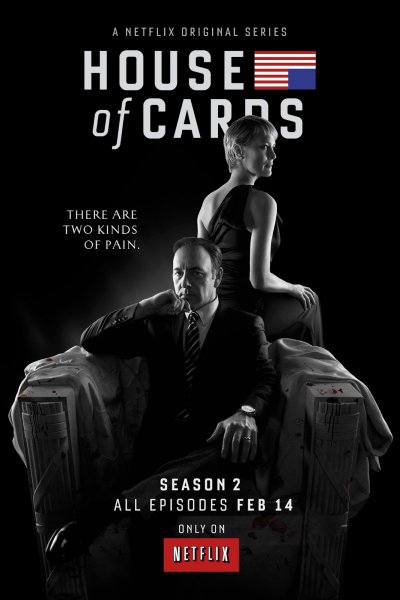
A promotional poster for season 2 of the popular House of Cards series. An executive of MRC Studios reportedly warned Gov. O'Malley that unless they received Maryland taxpayer subsidies in the form of tax credits for their venture, they would look to film in another state. A recent analysis by the state concluded that Maryland is reaping only 10 cents for every dollar it gives up. Another study places the figure at only 3 cents per dollar, or 3 percent.
ANNAPOLIS (Dec. 2, 2014)—Frank Underwood may be looking for a new base of operations.
Maryland tax credits worth millions have kept "House of Cards" in the state for three seasons, but a real-world budget crunch may mean Kevin Spacey—who plays the political villain—and rest of the cast and crew will head elsewhere.
A state legislative committee held a public hearing Tuesday on the feasibility of Maryland's film production tax credit, most notably associated with the Netflix series.
Film productions are exempt from state tax when purchasing goods or services related to the production, but the state is reaping only 10 cents for every dollar it gives up, according to a report from the state's Department of Legislative Services.
The report concludes that the credit does not promote long-term economic growth for Maryland and recommends that the General Assembly allow the film production activity tax to expire as scheduled on July 1, 2016.
Legislative Services staff members who contributed to the report were present at the meeting to defend their recommendations.
"The current funding amount is about $25 million (per year). But is that what optimizes economic benefits to the state?" said Robert Rehrmann, a policy analyst who contributed to the report.
Film production tax credits have become more popular in the last decade, with 37 states and the District offering some form of incentive in 2014.
In a letter to Gov. Martin O'Malley last year, Charlie Goldstein, senior vice president of MRC Studios, which produces "House of Cards," warned that if the show does not receive tax credits, they will look to film in another state.
In total for all productions, Maryland has provided or set aside $62.5 million in tax credits from fiscal year 2012 through 2016.
Supporters of the tax say the film industry promotes economic growth in Maryland by bringing in jobs and more local spending, and that we need to offer at least $25 million in credits each year to be competitive with what other states offer.
"For many small businesses in the state, it has made the difference for keeping their doors open, the difference in hiring new staff, or the difference in making capital improvements to their property, " said Hannah Byron, assistant secretary for the Maryland Division of Tourism, Film and the Arts.
While some small businesses are reaping the benefits, the Department of Legislative Services' report estimates that Maryland is only getting a 10-cent return for every dollar of tax credits provided to the film industry.
Byron countered that another independent study calculated a return of $1.03 - or 3 percent - on every dollar in credits, and that the Legislative Services report did not focus enough on indirect benefits of production, such as the potential for film tourism.
Still, the report has a few more criticisms, one being that 96.5 percent of all credits are going to only two productions - "House of Cards" and HBO's "VEEP."
The report also points out that a few jurisdictions benefit much more than others, and also that the productions are short-lived and will not add any permanent benefit to the economy because jobs provided will be temporary.
Michael Davis, a scenery builder in Maryland for over 27 years, disagreed with this idea Tuesday in testimony before the committee.
"I worked on project after project, sometimes more than one at a time, and other times no work at all … and the pay is at least 30 percent more per hour and we will work 50 to 60 hour per week during a production," Davis said.
However, Rehrmann reminded, the report shows less than one-tenth of 1 percent of Marylanders are employed by the film industry.
The decision on whether to extend or modify the current tax credit will have to be made by the General Assembly by July 1 and could be influenced by Gov.-elect Larry J. Hogan, Jr.
"We'll take a look at (the report) and have something to talk about later … there's one governor at a time," Hogan said Tuesday.


